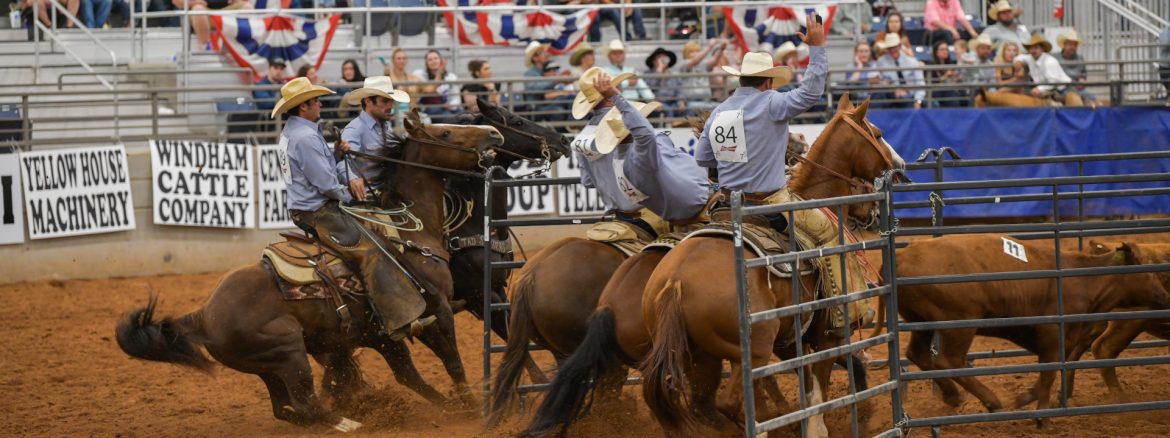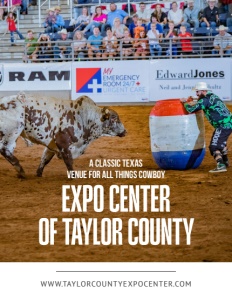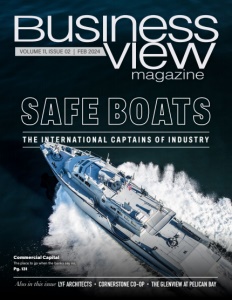The Expo Center of Taylor County
A classic Texas venue for all things cowboy
A revamped exposition center promotes its ranching and agriculture industries
The economy of Abilene, Texas has always been based on its livestock and agricultural sectors. The central Texas town was first established in 1881 as a shipping point on the Texas and Pacific Railway. From its beginnings, Abilene’s businesses and townspeople believed that showcasing the land’s bounty by way of an agricultural fair would help attract new settlers to the area, thus growing its population and increasing its wealth.
Throughout the first half of the 20th century, Abilene was host to several iterations of the West Texas Fair, which only operated intermittently, and sometimes not at all, when world events, such as the two World Wars, and the Great Depression shut down the show.
In 1954, city and county residents approved the construction of a new Taylor County Livestock & Exposition Center, which, when completed the following year, included a livestock barn and several smaller display buildings. In 1967, funding was approved for a new building on the site, the 5000-seat Coliseum, which, unlike the Center’s outdoor venues, would be able to provide heat for the spectators in the winter and cool air throughout the hot Texas summers. In 2016, a $55 million bond issue was passed for yet another round of updates, renovations, and expansions.
Economics drives renovations
Rochelle Johnson is the Expo Center’s Executive Vice President and General Manager. She started working at what is now a non-profit, 501(c)(3) organization, overseen by a Board of Directors, in 1984, and became GM in 2009.
Like many of her forebears, she has a firm belief that Abilene’s strength still lies in its ranching and agriculture industries and that to attract “out of town” money, it must continue to produce and promote events that appeal to the country’s farming, livestock- raising, and horse-riding communities.
“The equine and livestock part of the business brings people in from outside our community,” Johnson explains.
“That drives economic impact – people staying in hotels, eating in our restaurants, buying gas, buying tires for their vehicles if necessary, going to grocery stores. Many of the events that we have are multi-day events so they are spending money throughout our community. And that’s new money coming in that we wouldn’t see otherwise.”
“We generate approximately $30 million into our economy through facility rentals to businesses from out of town. And so, the economic impact from the agriculture part of the business is significant to Abilene. And we felt if we had state-of-the-art facilities, with better heating and air conditioning, with a good sound system, with adequate seating for larger events, that it would just bring in more business. And we succeeded in doing that. We’ve come to the point now that we are having to turn down business because we don’t have any more dates available — which is a good problem to have.”
Ultimately, the old livestock barn, which was built in the ‘50s, was torn down and replaced with a new one, which is called the First Financial Pavilion. Then, it was connected to the Guitar Arena, a 45,000-sq.-ft. livestock venue with stalls, pens, and portable bleachers, and the new Taylor Telecom Arena, which is home to the Center’s main rodeo events, making it possible to go from one facility to another without having to go outside.
The Coliseum, which was originally built for concerts but was also sometimes utilized as a dirt arena for horse shows was updated and cleaned up, never again to be filled with dirt and to be used only for concerts and presentations. The renovations were completed in 2021.
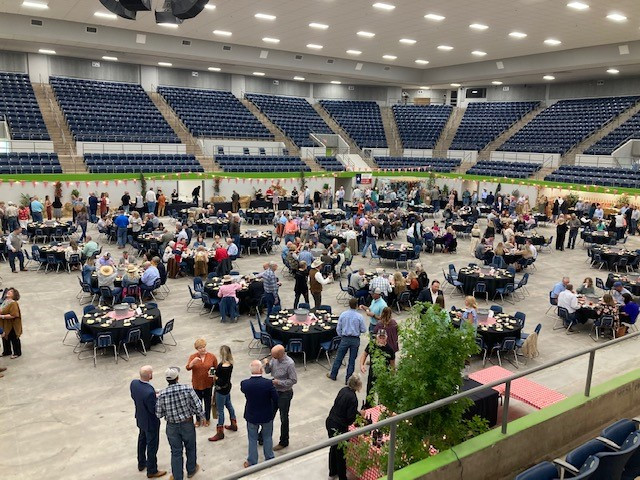
Center events
Today, approximately 350,000 attend the Center’s 270 events each year. Its two major offerings are the four-day Western Heritage Classic held in May and the ten-day West Texas Fair and Rodeo held in September. The main event at the Western Heritage Classic is a ranch rodeo.
“Ten historic ranches compete in ranch activities: branding, milking, doctoring, penning, and bronc riding,” says Johnson. “So, it’s a rodeo, but with events that are specific to ranching.”
“Along with that event, we have a Chuck Wagon Cook-off, and the largest Bit and Spur Show in the world,” she continues. “Bits are what you put in horses’ mouths to control them; cowboys wear spurs on their boots. It’s all handmade ‘tack,’ which is what it’s called in the equine industry — leather reins, saddles, bits, spurs — some of it’s for trading, some of it’s for selling.”
“We have 300 booths and tables that are set up to do this and you’ve got some of the finest bit makers and some of the finest leather people in the country attending this show and selling their wares. The two facilities that the show is held in during the Western Heritage Classic are just constantly crowded; people love to go through there. It’s a unique event within the show itself.”
“We also have the Rhinestone Round Up,” Johnson adds, “which is a gala. We also have cowboy poetry and music and Matched Horse Race World Finals. Western Heritage Classic is a huge gathering of ranching families – about 30,000 people attend that event. It has a very loyal following, and this will be the 39th year that it’s taking place.”
“Our other event is the West Texas Fair and Rodeo, which is exactly what it sounds like. It’s a livestock show, carnival, with creative arts and exhibitors, and our PRCA (Professional Rodeo Cowboys Association) Rodeo.”
In addition to renting out facilities for concerts, weddings, birthdays, quinceañeras, seminars, and club meetings, which all bring in revenue, the Center, as a non-profit entity, also hosts some community events, such as the Taylor County Livestock Show, where local 4-H and FFA (Future Farmers of America) members exhibit their prize-winning animals – goats, heifers, lambs, poultry, rabbits, steers, and swine.
“One of my employees is the secretary of that show and we donate time and effort towards putting it on,” Johnson notes.
The COVID conundrum
During the COVID pandemic, the Expo Center had a mixed record regarding its customary operations. “I had construction going on, and so I had to be here. So, we didn’t close down from that standpoint,” Johnson recounts. “But we did stop having the birthday parties and the wedding receptions, so we saw a decrease in revenue there. We were not able to have one of our largest events, the Western Heritage Classic in May of 2020, but we did have our Fair and Rodeo in September 2020, although our attendance was substantially less; I’d say by about 80,000 people.”
“We continued with our equine events, and we had several large livestock shows as a result of other fairs closing down. It was important to us, as well as to the youth in our state, that they could continue to have a ‘normal’ life and be able to show their animals.”
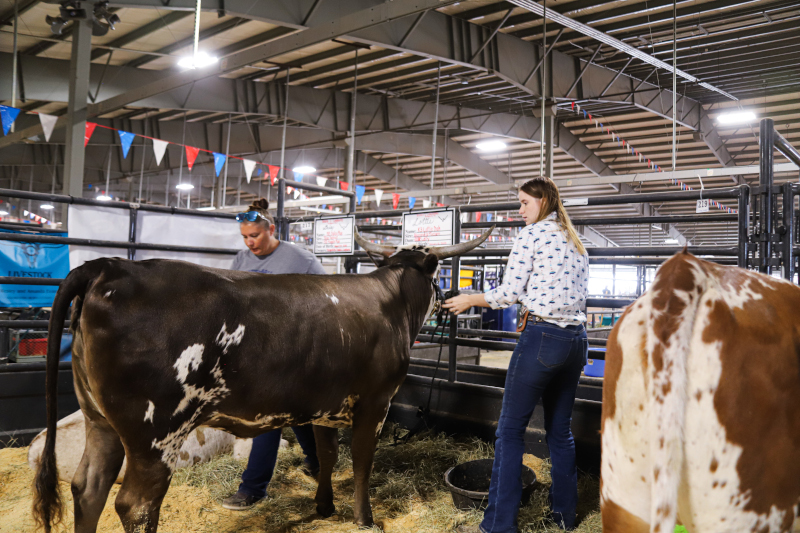
Help-seeking business
The greater Abilene community has, historically, always worked to promote the county’s fairs and expositions and that relationship continues to this day. “There’s a daily collaboration with our Abilene Convention and Visitors Bureau,” Johnson says. “And we are so fortunate to have them here in our city. They do such a tremendous job of soliciting business. That’s been one of the great things here at the Expo Center because I have not had to staff a position that goes out and recruits businesses.”
“The Convention Bureau does that for us. Regularly, they are out there looking at other events, businesses, conventions, and whatever, that are taking place, not only in Texas, but in the United States, and they have brought in many horse shows and other events that get tourists to come here, which is beneficial to our community.”
Johnson adds that the Expo Center also works closely with area hotels to make sure that they can offer the best possible rates to its visitors: “And then, we have many sponsorships and partnerships with businesses here in Abilene that help support the Expo Center as a non-profit organization to keep our prices reasonable so that these events will continue to choose Abilene.”
Looking ahead
“’2021 was still kind of an off-year for us,” Johnson reports. “’22 was a booming year; we saw an increase in all of our events’ attendance. And ’23 has become normal. I look for ’24 to be the same.” Going forward, Johnson says that she wants to capitalize on the recent renovations to the Coliseum to try to bring in more live entertainment. “That’s going to be my new focus,” she states, “trying to get more roadshows here. The facility seats about 8,000, so there’s a niche there.”
Meanwhile, this former farm girl, who was raised on an apple orchard and cattle ranch in New Mexico, says she will continue working at the same place where, so far, she has devoted all of her professional life. “This type of lifestyle is in my blood,” she relates.
“I grew up spending a lot of time outdoors with my father and my older brother. So, these ranching and farming people are people that I understand. I enjoy what I do, and I enjoy working with all the people we have the opportunity to meet. They’re not always from the same walk of life; the livestock people are the mainstay and the background that I came from, but then you have concerts, you have banquets — so there’s a wide variety of people and it’s a lot of fun.”
AT A GLANCE
The Expo Center of Taylor County
WHAT: A 117-acre event venue
WHERE: Abilene, Taylor County, Texas
WEBSITE: www.taylorcountyexpocenter.com
